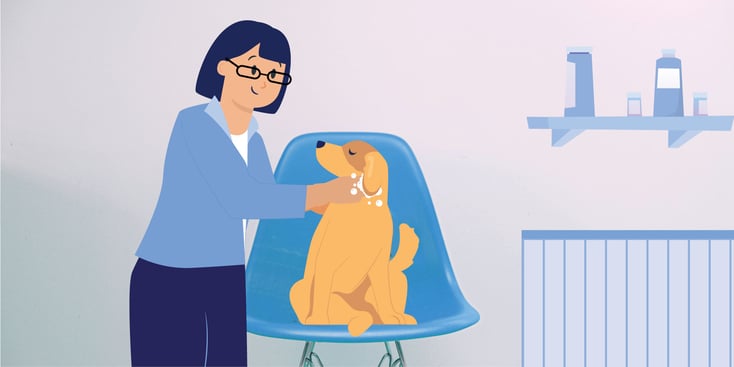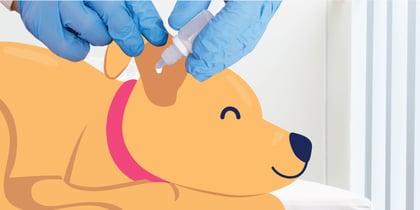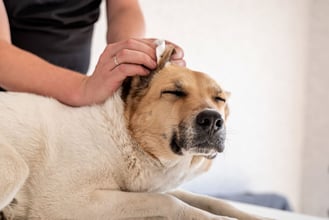How to Clean a Dog's Ears at Home: 10 Easy Steps

Table of Contents
As a pet parent, you want to ensure your dog stays healthy and comfortable. Regularly cleaning your dog's ears is an important way to achieve this and prevent ear infections. It may sound simple, but if cleaning your dog's ears at home makes you feel unsure, don't worry.
In this article, we'll guide you on how to clean your dog's ears effectively and explain why it's such an essential task.
Why Should You Clean Your Dog’s Ears?
Cleaning your dog's ears is important for their well-being. Regular cleaning helps prevent ear infections. This is especially true if your dog swims often has long or floppy ears, or has a fluffy coat. When wax or dirt accumulates in moist ear canals without proper airflow, bacteria can thrive and cause infections.
Additionally, if your dog frequently experiences itchy ears, it may be a sign of seasonal allergies, and keeping their ears clean is crucial in preventing painful infections.
When Should You Clean Your Dog’s Ears?
You should clean your dog's ears based on their specific needs. If your dog swims regularly, clean their ears after each swimming session. For dogs with furry or narrow ear canals or long, dangly ears, clean their ears at least once a week.
If your dog doesn't swim and doesn't have increased ear problem risks, check their ears weekly and clean them if visibly dirty. Consult with your veterinarian for a personalized plan for cleaning your dog's ears at home.
How to Clean Your Dog's Ears at Home
Cleaning your dog's ears is an important task to keep them healthy. While serious ear infections require veterinary treatment, you can clean your dog's ears at home if they are simply dirty.
Follow these 10 steps to clean your dog's ears effectively:
1. Choose a Suitable Place
Ear cleaning can get messy, so find a location with easy-to-clean surfaces like outdoors or wipeable areas. Avoid expensive rugs or new furniture.
2. Get Help
Cleaning your dog's ears is easier with an extra pair of hands. Ask a family member, friend, or neighbor to assist you in restraining your dog, as it's not a one-person job.
3. Be Gentle
Ear infections can make your dog's ears sore, so handle them with care to avoid causing discomfort.
4. Work Gradually
If your dog has never had their ears cleaned before, they may feel apprehensive. Take it slow and start by gently handling their ears, providing encouragement and treats. Gradually progress to cleaning the ears over time.
5. Lift the Ear Flap
Hold the ear up straight to expose the ear canal for easier cleaning.
6. Apply the Ear Cleaner
Most ear cleaners come in squeezy bottles. Insert the nozzle tip into your dog's ear canal and gently squeeze to fill the ear with the cleaning fluid. Don't worry about wasting some as it can be messy.
7. Massage the Ear
Use your fingers to massage the base of your dog's ear. You should hear a squelching noise as the cleaning liquid moves around, loosening the wax.
8. Wipe With Cotton Wool
Use cotton wool to wipe away excess ear cleaner. You can also clean the ear flap and external ear, but avoid inserting Q-tips or any other objects into the ear canal.
9. Repeat
One application may not be enough. Repeat the process until the ear cleaner you wipe away is clear of wax and dirt.
10. Stand Back!
After cleaning your dog's ears, give them some space. Dogs often shake their heads to remove excess moisture, so be prepared for some splatters of ear-cleaning solution.
Can You Treat a Dog Ear Infection at Home?
If your dog has dirty ears, it’s safe to treat them at home. However, for dog ear infections, an ear cleaner alone just doesn’t cut it. Dog ear infections can’t be treated at home without prescribed treatment from a veterinarian. Treatment usually involves antibiotic drops alongside an ear cleaner, but this depends on what type of infection your poor pooch has.
Should My Pet Be Seen by a Veterinarian?
1. Have you noticed changes in your pet’s appetite?
2. Does your pet have diarrhea or loose stools?
3. Have you noticed changes in your pet’s thirst/water consumption?
4. Is your pet having accidents in the house?
5. Is your pet pacing and unable to settle?
6. Is your pet panting more than usual?
7. Is your pet whining or vocalizing more than usual?
8. Is your pet shaking more than usual?
9. Is your pet hiding or avoiding physical contact more than usual?
10. Is your pet more lethargic and sleeping more than usual?
11. Are you concerned about changes in your pet’s behavior?
12. Is your pet scratching their ears?
13. Is your pet licking their paws more than usual?
14. Does your pet have a rash?
15. Is your pet moving more slowly than usual or having a harder time getting up or down?
View Results
Should My Pet Be Seen by a Veterinarian?
1. Have you noticed changes in your pet’s appetite?
2. Does your pet have diarrhea or loose stools?
3. Have you noticed changes in your pet’s thirst/water consumption?
4. Is your pet having accidents in the house?
5. Is your pet pacing and unable to settle?
6. Is your pet panting more than usual?
7. Is your pet whining or vocalizing more than usual?
8. Is your pet shaking more than usual?
9. Is your pet hiding or avoiding physical contact more than usual?
10. Is your pet more lethargic and sleeping more than usual?
11. Are you concerned about changes in your pet’s behavior?
12. Is your pet scratching their ears?
13. Is your pet licking their paws more than usual?
14. Does your pet have a rash?
15. Is your pet moving more slowly than usual or having a harder time getting up or down?
Share Quiz
Conclusion
In conclusion, regularly cleaning your dog's ears at home is important for their health and preventing ear infections. Follow this 10-step guide provided to clean your dog's ears effectively.
Remember to seek veterinary advice if your dog has a serious ear infection or shows signs of discomfort. Take care of your furry friend by giving their ears the attention they need.





